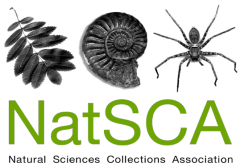Identification Trainers for the Future Traineeship
Do you regularly record wildlife either at home or as part of a recording scheme? Are you keen to develop a career in the UK biodiversity sector and to be at the forefront of the resurgence in species identification and taxonomic skills in UK wildlife professionals? If so, you may be exactly the candidate we are looking for.
Funded by the HLF’s Skills for the Future programme, the Natural History Museum, in partnership with the Field Studies Council and National Biodiversity Network, has an exciting new traineeship opportunity to address the decline in species identification skills in the UK biodiversity sector. Between 2015 and 2017 we will be offering fifteen 12-month long traineeship posts based within the Angela Marmont Centre for UK Biodiversity. We are now looking to recruit the third group of 5 of these trainees, who will be starting with us in March 2017.
Anyone who can demonstrate a passion for developing a career in wildlife recording, species identification and environmental education is welcome to apply. We do specify however the following restrictions to applicants as the traineeship is intended for early career wildlife professionals:
Minimum qualifications: 3 A-levels or equivalent· No more than 6 months paid employment in the UK biodiversity, ecology or conservation sector (no previous paid employment is fine).
· Not previously undertaken a similar traineeship in the UK biodiversity, ecology or conservation sector.
Contract Type: 12-month traineeship
Bursary award: £16,500 per annum (tax exempt) plus benefits
Application Close Date: 9am, 17 October 2016
Selection day: Week commencing 5 December 2016
Role competences: As part of the on-line application, you must provide answers to the following questions. These will be used to short list applicants who will be invited to the selection day. Don’t forget that there is a ‘hints and tips’ sheet on the traineeship webpage (www.nhm.ac.uk/idtrainers) to help you develop your answers to these questions.
1. Describe your areas of interest in UK wildlife. Which groups of species are you particularly interested in?
2. Using relevant examples, describe your involvement in recording UK wildlife. This may be through local or national recording schemes, undertaken as part of a voluntary role you have been doing, a private research project, a project undertaken in school, college or university, or simply recording the wildlife that comes to your garden, local park or nature reserve.
3. Why do you think it is important to support and train people to record wildlife in the UK?
4. The traineeship programme focuses on developing your ability to teach and train others, as well as your species identification skills. Using your own experiences of courses or classes you have attended as examples (whether wildlife-related or not), what do you think are the key features of a good training session?
5. How do you think undertaking this traineeship will benefit you and your future career?
Online application process: Apply on-line before 9am on the 17th October 2016 through the NHM website: http://www.nhm.ac.uk/search-vacancies. For internal applications please apply through the Internal NHM website
Complete the on-line application form. In the ‘Other Information’ section, please provide specific examples from your achievements, knowledge, skills or experience to illustrate your answers to each of the application questions (section 3) for the role. You must complete this section. Please use one field per application question, you can use a maximum of 140 words per field.
Please note:
You must fully complete your on-line application, CV’s are not being accepted for this traineeship
Partially completed applications with CVs attached will be rejected.
Individual cover letters and CVs submitted outside of the on-line application system will not be considered.
The ‘Other Information section’ the system runs on a 35 minute cycle and you will lose any unsaved information. To avoid this, save your application frequently or write your answers in a word document and paste them into the answer fields. Please be aware that anything entered onto the form will not save unless text has been added to all mandatory fields
